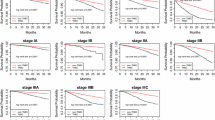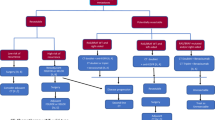Abstract
Microsatellite instability (MSI) status is a good prognostic factor for colorectal cancer (CRC), but its predictive value for chemosensitivity remains controversial. We recently performed a meta-analysis (MA) in adjuvant setting showing that MSI high (MSI-H) status did not predict the efficacy of chemotherapy. Studies were identified by electronic search through PubMed, Embase and ASCO proceedings online databases, using several keywords (colorectal cancer, chemotherapy, microsatellite instability). For each study, we calculated the ratio of response rate, complete and partial responses divided by stable disease and progression. Our MA dealt with the predictive value of MSI status on the effect of metastatic chemotherapy using various combinations of 5FU, oxaliplatin or CPT11. From 159 articles and 76 abstracts, we selected only seven independent studies. Data were analysed with a random-effect model (due to heterogeneity between studies) using EasyMA software. Statistical calculations were performed on five studies representing 860 patients (mean age 63 years; 87 MSI-H; 733 microsatellite stable [MSS] tumors). A total of 287 patients received 5FU-based chemotherapy, whereas 574 patients received combinations of 5FU or capecitabine with oxaliplatin and/or irinotecan. Our MA found no benefit of metastatic chemotherapy in terms of response rate for MSI-H patients compared with MSS patients. The global hazard ratio for response rate was 0.83 (95% confidence interval: 0.95; 0.65–1.05; p = 0.11). In conclusion, MSI status did not predict the effect of chemotherapy for metastatic CRC. Metastatic chemotherapy had a similar effect on both MSI-H or on MSS tumors.


Similar content being viewed by others
References
Weitz J, Koch M, Debus J, Hohler T, Galle PR, Buchler MW (2005) Colorectal cancer. Lancet 365:153–165
Duval A, Hamelin R (2002) Mutations at coding repeat sequences in mismatch repair-deficient human cancers: Toward a new concept of target genes for instability. Cancer Res 62:2447–2454
Popat S, Hubner R, Houlston RS (2005) Systematic review of microsatellite instability and colorectal cancer prognosis. J Clin Oncol 23:609–618
Umar A, Boland CR, Terdiman JP, Syngal S, Chapelle ADL, Ruschoff J et al (2004) Revised Bethesda Guidelines for hereditary nonpolyposis colorectal cancer (Lynch Syndrome) and microsatellite instability. J Natl Cancer Inst 96:261–268
Boland CR, Thibodeau SN, Hamilton SR, Sidransky D, Eshleman JR, Burt RW et al (1998) A National Cancer Institute Workshop on microsatellite instability for cancer detection and familial predisposition: Development of international criteria for the determination of microsatellite instability in colorectal cancer. Cancer Res 58:5248–5257
Buhard O, Cattaneo F, Wong YF, Yim SF, Friedman E, Flejou J-F et al (2006) Multipopulation analysis of polymorphisms in five mononucleotide repeats used to determine the microsatellite instability status of human tumors. J Clin Oncol 24:241–251
Altman DG (2001) Systematic reviews in health care: Systematic reviews of evaluations of prognostic variables. BMJ 323:224–228
Fallik D, Borrini F, Boige V, Viguier J, Jacob S, Miquel C et al (2003) Microsatellite instability is a predictive factor of the tumor response to irinotecan in patients with advanced colorectal cancer. Cancer Res 63:5738–5744
Brueckl WM, Moesch C, Brabletz T, Koebnick C, Riedel C, Jung A et al (2003) Relationship between microsatellite instability, response and survival in palliative patients with colorectal cancer undergoing first-line chemotherapy. Anticancer Res 23:1773–1777
Jin-Tung L, Kou-Chin H, Hong-Shiee L, Po-Huang L, Yung-Ming C, Hey-Chi H, Ann-Lii C, Chih-Hung H, Kun-Huei Y, Shih-Ming W, Chi T, King-Jen (2002) High-frequency microsatellite instability predicts better chemosensitivity to high-dose 5-fluorouracil plus leucovorin chemotherapy for stage IV sporadic colorectal cancer after palliative bowel resection. International Journal of Cancer 101:519–525
Rosty C, Chazal M, Etienne MC, Letoublon C, Bourgeon A, Delpero JR et al (2001) Determination of microsatellite instability, p53 and K-RAS mutations in hepatic metastases from patients with colorectal cancer: Relationship with response to 5-fluorouracil and survival. Int J Cancer 95:162–167
des Guetz G, Mariani P, Cucherousseto J, Benamoun M, Lagorce C, Sastre X et al (2007) Microsatellite instability and sensitivity to FOLFOX treatment in metastatic colorectal cancer. Anticancer Res 27:2715–2719
Bendardaf R, Lamlum H, Ristamaki R, Korkeila E, Syrjanen K, Pyrhonen S (2007) Mismatch repair status is a predictive factor of tumour response to 5-fluorouracil and irinotecan chemotherapy in patients with advanced colorectal cancer. Tumour Biol 28:212–220
Koopman M, Kortman GA, Mekenkamp L, Ligtenberg MJ, Hoogerbrugge N, Mol L et al (2007) Use of microsatellite instability in non-hereditary advanced colorectal cancer to predict response to chemotherapy and overall survival: A study of the Dutch Colorectal Cancer Group (DCCG). J Clin Oncol (Meeting Abstracts) 25:4118
Jensen LH, Danenberg KD, Danenberg PV, Jakobsen A (2007) Predictive value of MSH2 gene expression in colorectal cancer treated with capecitabine. Clin Colorectal Cancer 6:433–435
Compton C, Pettigrew N, Fielding LP (2000) American Joint Committee on Cancer prognostic factors consensus conference. Cancer 88:1739–1757
Halling KC, French AJ, McDonnell SK, Burgart LJ, Schaid DJ, Peterson BJ et al (1999) Microsatellite Instability and 8p allelic imbalance in stage B2 and C colorectal cancers. J Natl Cancer Inst 91:1295–1303
Lynch HT, Smyrk TC, Watson P, Lanspa SJ, Lynch JF, Lynch PM et al (1993) Genetics, natural history, tumor spectrum, and pathology of hereditary nonpolyposis colorectal cancer: An updated review. Gastroenterology 104:1535–1549
Muller CI, Schulmann K, Reinacher-Schick A, Andre N, Arnold D, Tannapfel A et al (2008) Predictive and prognostic value of microsatellite instability in patients with advanced colorectal cancer treated with a fluoropyrimidine and oxaliplatin containing first-line chemotherapy. A report of the AIO Colorectal Study Group. Int J Colorectal Dis 23(11):1033–1039
Baddi L, Benson A III (2005) Adjuvant therapy in stage II colon cancer: Current approaches. Oncologist 10:325–331
Ribic CM, Sargent DJ, Moore MJ, Thibodeau SN, French AJ, Goldberg RM et al (2003) Tumor microsatellite-instability status as a predictor of benefit from fluorouracil-based adjuvant chemotherapy for colon cancer. N Engl J Med 349:247–257
Sargent DJ, Marsoni S, Thibodeau SN, Labianca R, Hamilton SR, Torri V et al (2008) Confirmation of deficient mismatch repair (dMMR) as a predictive marker for lack of benefit from 5-FU based chemotherapy in stage II and III colon cancer (CC): A pooled molecular reanalysis of randomized chemotherapy trials. J Clin Oncol (Meeting Abstracts) 26:4008
Des Guetz G, Uzzan B, Nicolas P, Schischmanoff P, Morere JF (2008) Microsatellite instability as a predictor of chemotherapy efficacy in colorectal cancer. J Clin Oncol (Meeting Abstracts) 26:4117
Conflict of interest statement
No funds were received in support of this study.
Author information
Authors and Affiliations
Corresponding author
Rights and permissions
About this article
Cite this article
Des Guetz, G., Uzzan, B., Nicolas, P. et al. Microsatellite instability: a predictive marker in metastatic colorectal cancer?. Targ Oncol 4, 57–62 (2009). https://doi.org/10.1007/s11523-008-0103-8
Received:
Accepted:
Published:
Issue Date:
DOI: https://doi.org/10.1007/s11523-008-0103-8




